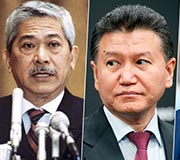In 2002, Ignatius Leong, an organizer from Singapore, was going to run in the elections (later he was punished by the same ethics commission together with Kasparov), who controlled the votes of several Asian countries. However, personal negotiations with Ilyumzhinov convinced Leong to withdraw his candidacy.
And the first serious fight took place in 2006, where Ilyumzhinov's opponent was Bessel Kok, a Dutch businessman, organizer of many super tournaments and one of the founders of the Grandmaster Association. The Western world supported Kok, and at the 2006 Olympics his supporters appeared in orange T-shirts and orange caps with the words “Right move”, which happened just against the background of the so-called colour revolutions taking place one after another in the former USSR.
But only 54 delegates made the “correct move”, while 96 others made their move in favour of the Russian Ilyumzhinov. A major role in the victory of the President of Kalmykia was played by the votes controlled by Markopoulos. During all the years of the reign of the sixth FIDE President, it was the vice-president from Greece who was the right hand of the head of the international federation until the well-known events, when Markopoulos decided that it was time for him to become the leader himself.
Four years later, Anatoly Karpov entered the battle for the presidency, and he did it with the support of Garry Kasparov.
The battle for FIDE was preceded by a real battle for the vote from the RCF and, as a result, the Russian Chess Federation supported Ilyumzhinov. However, the team of Alexander Bach with the help of OMON was replaced by a team of young managers led by Ilya Levitov.
Of course, Karpov had great political weight, but Ilyumzhinov again won, while 13 ballots turned out to be invalid in a strange way. Alleging violations, Karpov filed a sports arbitration court, however, Ilyumzhinov filed a lawsuit against Karpov in a Russian court. The case ended with the reconciliation of the parties.
In 2014, Kasparov oppsed Ilyumzhinov's post, but he also failed because majority voted in favour of the incumbent president. However, a geopolitical battle soon began between the United States and Russia and Ilyumzhinov was put on the State Department’s sanctions list. He could no longer perform the functions of president, although he fought for his post to the last.
Elections in 2018 also turned out to be difficult. A real battle broke out: the Russian candidate Arkady Dvorkovich accused his opponent Markopoulos of corruption, who finally decided to get the papal tiara.
The elections in Georgia were followed by a whole series of scandals: the ethics committee met, the FIDE lawyer and well-known expert Alexander Martynov almost got into hand-to-hand combat with the son of Markopoulos, and so on. But in the end, Dvorkovich was supported by many third world countries and the Association of Chess Professionals, whose head, Israeli grandmaster Emil Sutovsky, became the general director of the team of the victorious Dvorkovich.
So, as you can see, chess elections are always connected with geopolitics. The elections, which will take place in the autumn of 2022, will be no exception.
 Once again taking the presidency, Florencio Campomanes faced unsolvable problems. There was no money for the men's and women's qualifying rounds, FIDE was on the verge of bankruptcy. The opposition demanded Campo's resignation, and in 1995 he abruptly relinquished the presidency in favour of the still unknown Kirsan Ilyumzhinov. The 1996 Congress confirmed the powers of a prominent businessman and the President of Kalmykia.
Once again taking the presidency, Florencio Campomanes faced unsolvable problems. There was no money for the men's and women's qualifying rounds, FIDE was on the verge of bankruptcy. The opposition demanded Campo's resignation, and in 1995 he abruptly relinquished the presidency in favour of the still unknown Kirsan Ilyumzhinov. The 1996 Congress confirmed the powers of a prominent businessman and the President of Kalmykia.






















